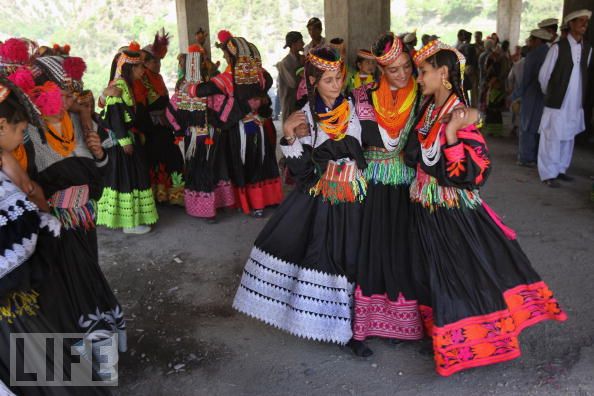|
saLT |
the-south-asian Life & Times April-June 2011 |
|
|||
|
Cover Story Lifestyle Aviation The
First Aerial Shots Trivandrum's
New Society Wildlife Corbett
Wildlife
Comment
|
|
||||
|
Kalasha
– the last pagan tribe of the Hindu Kush
The Kalasha of Chitral valley in Pakistan are deeply spiritual and charmingly liberal; both sexes have a fondness for wine and dance; women wear elaborate headdresses, not burqas; there is no concept of good or evil – everything is a balance of male and female energies; there are no prisons; there is no written law; they worship multiple gods; and there is no word for goodbye! But the frail identity of Kalasha, already an endangered culture, is being threatened by Muslim fundamentalists, tourism and neglect by government. "Contemporary accounts of the Kalasha - including ethnography, development prospectuses, and travel journalism - reiterate a handful of romantic motifs: mysterious 'Aryan' origins, or legendary Greek descent from Alexander III of Macedon; ancient shamanic mysteries; prehistoric 'children of nature'; an arcadian 'lost world'. These familiar tropes of Shangri-la, earlier applied to the Afghan Kafirs or the Burusho of Hunza, are quite recent exotic configurations for the Kalasha" – Peter Parkes, Professor of Anthropology Legend has it that Kalasha, the present inhabitants of three narrow and idyllic valleys in Chitral (in Pakistan), near the Afghan border, high in the lofty Hindu Kush mountains, have descended from the armies of Alexander, who tore across the region more than 2,000 years ago. Cut off from the rest of the country by high mountain passes - and by snow for six months of the year - the Kalasha have lived here for thousands of years and are the last remnants of the indigenous non-Muslim population, greatly reduced in numbers by forced conversions to Islam following the conquest by invading Muslim armies around the sixteenth century. About 4,000 Kalasha, who resisted conversion, survive in the refuge of three majestic valleys - Rumbur, Bomboret, and Birir – an area that came to be known as Kafiristan or ‘the land of infidels’.
Read the entire article in the print
edition
|
|||||
|
Copyright © 2000 - 2011 [the-south-asian.com]. Intellectual Property. All rights reserved. |
|||||
